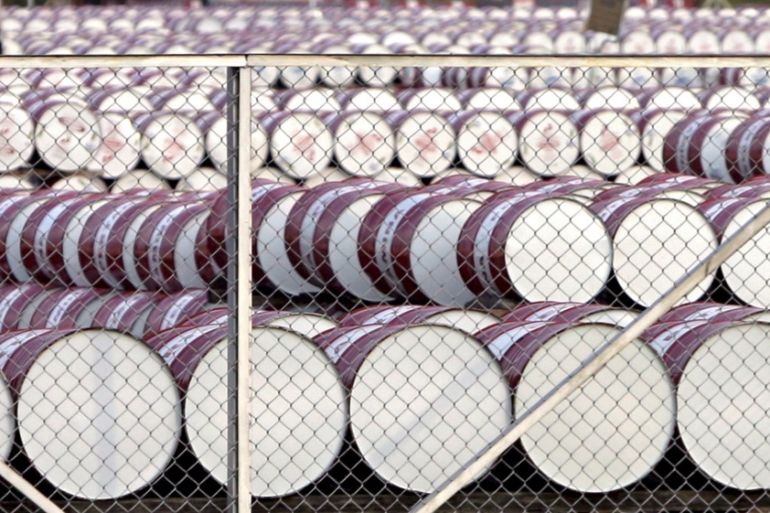Russia offers reassurance over global oil stockpiles
Russian energy minister rules out upping oil production levels as crude prices soar after Saudi Aramco attack.

There is enough oil in global stockpiles to replace production capacity Saudi Arabia has temporarily lost due to attacks on its oil facilities, Russia’s energy minister Alexander Novak, an ally of Riyadh in a pact to curb supply, told reporters on Monday.
Saturday’s attack on Saudi Arabia’s oil infrastructure, which temporarily stopped about five percent of global supply, caused the biggest surge in Brent crude prices since the 1991 Gulf War.
Keep reading
list of 4 itemsWhy is Biden ratcheting up the trade war with China?
Ivorian cocoa farmers ‘barely survive’ while chocolate company profits soar
Singapore Airlines death: Is climate change making air turbulence worse?
Oil producer Saudi Aramco said the attack, which Yemen’s Iran-allied Houthi rebels have claimed responsibility for, had cut output by 5.7 million barrels per day (bpd).
Asked whether Russia was ready to increase production, Novak said that Saudi Arabia would first provide its estimate of the attack’s consequences.
“But currently, we understand that the world has enough commercial stockpiles to cover the shortage… in the mid-term,” Novak said, adding he planned to have a call with his newly appointed Saudi counterpart, Prince Abdulaziz bin Salman.
Novak said Russia was sticking to its commitments under the global oil production deal and that it was premature to talk about any possible changes to production levels.
Saudi Arabia, the United States and China have hundreds of millions of barrels of oil in strategic reserve. US President Donald Trump said on Sunday he had authorised a release from the US Strategic Petroleum Reserve.
The International Energy Agency (IEA), which coordinates energy policies of industrialised nations, advises all its members to keep the equivalent of 90 days of net oil imports in storage.
OPEC Secretary-General Mohammed Barkindo discussed the oil market developments with IEA head Fatih Birol, and both expressed satisfaction that “the situation has been brought under control by the Saudi authorities”, according to an OPEC source cited by Reuters news agency.
Kremlin spokesman Dmitry Peskov told reporters separately on Monday that Russia would wait to see how the situation develops before taking any action on production.
According to a Citibank note, Russia has roughly 295,000 bpd of idle oil capacity, with about half of that at top oil producer Rosneft.
Most of the idle capacity “could come online in the course of a few days to a few weeks,” Citi said.
Crude prices soar
European shares meanwhile fell on Monday after four straight sessions of gains amid concern over the attacks on Saudi Aramco and weak Chinese data, which added to worries over global growth while boosting shares in unaffected oil producers.
Crude prices went soaring as much as 19 percent and pushed the oil & gas index 2.4 percent higher, driving roughly three percent gains for majors BP and Shell.
UK and Irish-based explorer Tullow Oil jumped seven percent, to the top of Europe’s STOXX 600, after the firm said it plans to drill three or more exploration wells in Guyana next year following its second oil discovery in the country.
Abid Ali, Al Jazeera’s economics editor, said the spike was proof that “a lot of people are unconvinced that the Saudi’s have got this problem under control”.
“The markets are waiting to hear from the Saudis and to get some more reassurance that they are going to be able to put more crude back on to the market as soon as possible,” Ali added.
All other major European sectoral indexes fell, with travel and leisure the worst-hit with a one-percent slide, dragged down by shares of airlines Ryanair Holdings, Air France KLM SA and EasyJet PLC.
“Usually, higher oil prices are a product of higher demand, but in a scenario like this where supply is squeezed because of an attack, that is the worst of both worlds,” David Madden, market analyst at CMC Markets, told Reuters.
“China’s economy is clearly fuelling down; things in the US-China trade situation are looking a bit better but not good; Germany is potentially looking towards a recession. The last thing the global economy now needs is a surge in oil prices.”